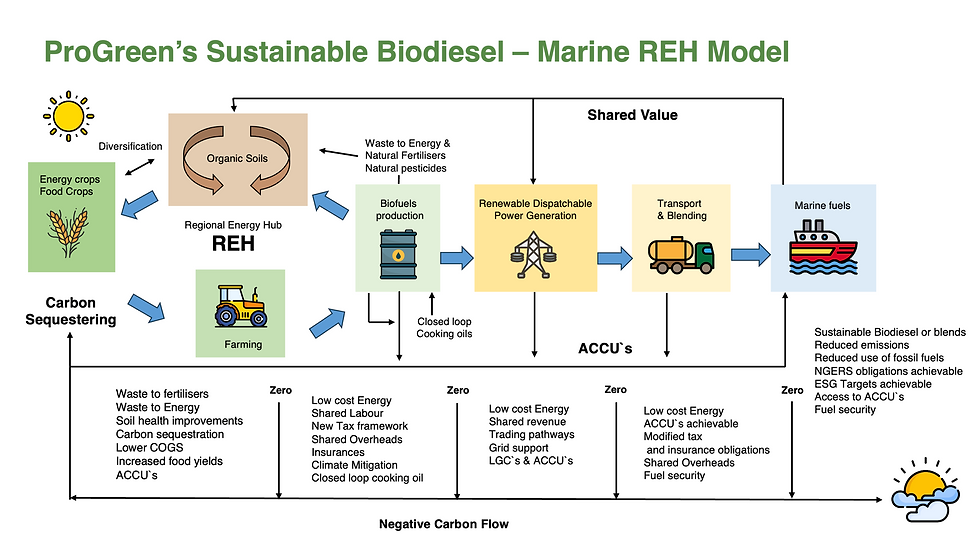The ProGreen Biofuels Sustainable Biodiesel Roadmap
- jasonw05
- Oct 28, 2025
- 4 min read
Updated: Nov 30, 2025
Introduction
Australia faces both a strategic fuel security challenge and a climate imperative. Farmers and regional communities are well placed to lead the transition to sustainable biofuels, creating new revenue streams while improving soil health and strengthening local economies.
ProGreen Biofuels’ Regional Energy Hubs (REH) link energy crop rotations with carbon-neutral biodiesel production and dispatchable generation capacity. Designed to complement existing agricultural practices and build energy independence, the model creates shared value for farmers, local communities, and energy customers.
By rotating oilseed crops for local biodiesel production, we could:
Produce millions of litres of biodiesel annually, meaningfully offsetting mineral diesel imports and carbon intensity of transport fuels.
Sequester millions of tonnes of CO₂ through rotational cropping, soil carbon initiatives and the introduction of bio-fertilisers and fumigants.
Enhance soil health and water retention for greater farm resilience.
Diversify farm incomes via carbon credits, energy farming practices promoting better food yields and shared revenue from energy markets – without the need for agricultural land use conversion.

The ‘Diesel Challenge’
Australia’s dependence on imported diesel is a national vulnerability. We import about 90% of our liquid fuels, with only ~32 days of diesel reserves (far below the 90-day International Energy Agency benchmark.) Diesel is the backbone of agriculture, freight, and critical infrastructure, making this a strategic risk for Australia’s economy and food systems.
With minimal domestic biodiesel production, Australia exports valuable oilseeds and animal fats for biodiesel production offshore – foregoing local value creation, job opportunities, and energy security.
Why this matters for Australia:
Fuel insecurity threatens supply chains and increases input costs.
Policy gaps mean Australia lacks the mandates and incentives other countries use to drive biofuel uptake.
Environmental risks arise from carbon intensive imported fossil fuels.
Land Productivity being driven by increased chemical inputs like fertilisers, pest and disease controls.
Australia can flip this challenge into opportunity by building a resilient, crop-based biodiesel industry supported by natural inputs, delivering local energy security, farmer participation, and traceable carbon benefits.
The case for home-grown biofuels
Liquid biofuels are gaining momentum as renewable alternatives, particularly for hard-to-abate sectors such as:
Heavy-duty transport,
Maritime Transport
Distributed power generation.
But currently, only 1% of Australia’s agricultural land grows oilseed crops, and 80% of this is exported – primarily for offshore biofuel production. The untapped potential is immense. If 10% of existing agricultural land rotated oilseed crops for local biodiesel, Australia could produce 10 billion litres of biodiesel annually, creating both domestic energy security and significant carbon sequestration.
Why ‘renewable’ must be ‘sustainable’
Not all renewable fuels are created equal. Some fuel types are not sustainable when full life-cycle costs are considered. Soil degradation, inefficient logistics, and fragmented supply chains can erode environmental benefits.
ProGreen Biofuels’ Sustainable Biodiesel model ensures that renewable means sustainable, by embedding:
Natural capital assessment and soil carbon measurement at the farm level.
Regenerative crop rotations that enhance soil health and biodiversity.
Closed-loop production, achieving zero waste and carbon neutrality.
Circular economy practices, with profits reinvested into local farms and energy infrastructure.

ProGreen Biofuels’ Regional Energy Hub (REH) model
ProGreen Biofuels was established in 2004 to commercialise outcomes from a high-performance engine test facility developed in collaboration with RMIT University, ProGreen Biofuels has spent two decades developing a biodiesel model that is environmentally sustainable, economically viable, and socially inclusive.
The REH model is designed around small-to-medium volume biodiesel facilities owned and operated in collaboration with the participating farmers and often a single key partner/customer that:
Provide enough biodiesel to support, the REH supply chain, a partner/customer needs and ~ a local network of dispatchable generators for critical demand trading to offset production costs through additional high-value revenue streams.
Are partially financed by key partner/customer (e.g., Key fleet owner/partner) to ensure commercial viability.
Source energy crops (canola or mustard) grown by participating farmers under a Carbon Tracking Program, guaranteeing carbon neutrality and soil carbon gains creating a pathway to ACCU`s.
Key features:
Carbon Reduction Certificates (CRCs) issued monthly to quantify emissions reductions for customer ESG reporting.
Potential to generate Australian Carbon Credit Units (ACCUs) via Emissions Reduction Fund from soil carbon initiatives and the use of the biodiesel throughout the farming and supply chain.
Farmer equity options in REH infrastructure and energy farming programs.
Closed-loop production with zero carbon and zero waste, supported by a fully carbon-neutral supply chain.
The opportunity for farmers
Food and fuel security:
Energy crops are integrated into existing rotations, supporting food production while providing a renewable energy feedstock.
Soil health and ecosystem resilience:
Energy rotations improve soil structure, microbial diversity, and moisture retention – reducing erosion and enhancing productivity.
Diversified income streams:
Revenue from energy crop sales and participation in energy hubs.
Carbon credit opportunities from soil carbon projects and CRCs.
Equity participation in REH infrastructure for long-term returns.
Additional revenue through dispatchable generators.
No land use change:
ProGreen Biofuels’ model works with existing farming systems, adding value without displacing agricultural land use.
Benefits to Australia and regional communities
Energy security:
Locally produced biodiesel reduces reliance on imported fuels.
Economic development:
Investment in REH infrastructure creates regional jobs and stronger local economies.
Climate action:
Aligns with Australia’s Net Zero Plan and national decarbonisation targets.
Community engagement:
Prioritising consultation ensures projects are co-designed, landowner priorities are accounted for, and community support is maintained.
Next-generation farming:
Opportunities for younger farmers to diversify farm business activities, drive profitability, and lead energy and carbon farming initiatives.
Conclusion
Sustainable biodiesel represents a triple win for Australia: reducing emissions, improving energy independence, and empowering regional communities.
With ProGreen Biofuels’ REH model offers a scalable pathway to deliver this vision – linking farmers, communities, and government in a secure, sustainable energy future.

